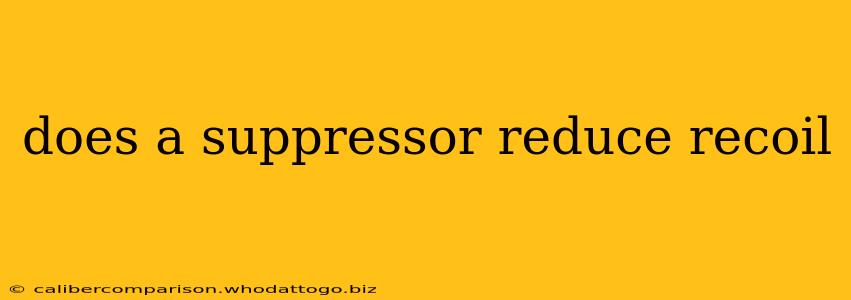The short answer is: a suppressor can slightly reduce recoil, but it's not its primary function and the effect is often negligible. While many shooters believe suppressors significantly reduce felt recoil, the reality is more nuanced. Let's delve into the mechanics and explore why the impact is often minimal.
The Physics of Recoil: More Than Just Gas
Recoil isn't simply about the expulsion of gases from the barrel. It's a complex interplay of several factors:
-
Gas Pressure: The expanding gases pushing the bullet down the barrel exert an equal and opposite force on the firearm, contributing significantly to felt recoil. Suppressors do reduce gas pressure slightly by slowing the expansion of gases, but this reduction is often minimal, especially in short-barreled firearms.
-
Bullet Weight and Velocity: Heavier bullets traveling at slower speeds generate less recoil than lighter, faster bullets. A suppressor doesn't alter these factors.
-
Gun Weight and Design: A heavier firearm absorbs recoil more effectively than a lighter one. The design of the firearm itself, including the stock and recoil pad, also plays a crucial role in managing recoil. A suppressor doesn't change the weight or design of the firearm.
-
Action Type: The type of firearm action (e.g., semi-automatic, bolt-action, revolver) influences recoil. A suppressor doesn't alter the inherent recoil characteristics of the action.
How a Suppressor Might Slightly Reduce Recoil
The slight reduction in recoil some shooters experience with a suppressor is primarily due to the slight decrease in gas pressure mentioned earlier. However, this effect is often subtle and masked by other recoil factors. Additionally, the added weight of the suppressor might also contribute a minuscule reduction in perceived recoil, acting as a small counterweight.
Why the Recoil Reduction is Often Unnoticeable
The impact of a suppressor on recoil is often insignificant because:
-
Other Factors Dominate: The bullet's weight and velocity, the firearm's weight and design, and the action type all play a much larger role in determining felt recoil.
-
Subtle Gas Pressure Reduction: The pressure reduction achieved by a suppressor is often too small to significantly impact the overall recoil impulse.
-
Individual Perception: Felt recoil is subjective. What one shooter perceives as a noticeable reduction, another might not even feel.
Conclusion: Focus on Recoil Management Elsewhere
While a suppressor might contribute to a tiny reduction in recoil, relying on it for significant recoil management is misguided. For substantial recoil reduction, focus on these instead:
-
Choose a Heavier Firearm: A heavier gun absorbs recoil more effectively.
-
Use a Recoil Pad: A good recoil pad significantly reduces felt recoil.
-
Proper Shooting Technique: A firm grip and proper stance are crucial for managing recoil.
Ultimately, a suppressor's primary function is sound suppression, not recoil reduction. While a minor impact on recoil might occur, it shouldn't be a primary factor in deciding whether or not to use one.

